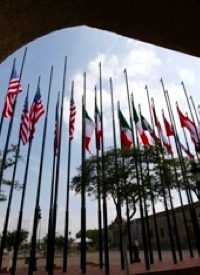
President Barack Obama will meet with Canadian President Stephen Harper and Mexican President Felipe Calderon this weekend in Guadalajara, Mexico, for a North American Leaders Summit. The host of issues they are expected to discuss this weekend includes immigration, drug violence, trucking, and the Canadian objections to the “buy American” provisions adopted by Congress earlier this year in the “stimulus” legislation.
But the push for a North American Union (NAU) that establishment politicians and their lobbyists in elite private foundations are seeking now appears to be at the bottom of the list of issues.
But that hasn’t stopped some of the more dogged proponents of eroding national sovereignty from pushing their agenda. “Drop the Security and Prosperity Partnership. Let it die in Guadalajara and commit to renegotiating NAFTA because we don’t see it as being as beneficial to the majority of North Americans as it has been for large corporations,” Robert Pastor told the Edmondton Sun on August 7. Pastor is among the most dogged proponents of a “North American Community,” having written in favor of the concept for both the Council on Foreign Relations and the Trilateral Commission in recent years. He’s also co-director of the Center for North American Studies and a professor of international relations at American University in Washington.
With drug lords shooting people in broad daylight on Mexican streets, and the Mexican President Calderon complaining that the promised U.S. $1.4 billion in aid is slow in coming, it’s hardly surprising that Washington insiders are putting a political merger of the continent on the back burner, at least for the time being. The American people would clearly never go along with a deal to merge the fates of the three nations, particularly under current political circumstances.
Yet even before President George W. Bush and his Canadian and Mexican counterparts signed the Security and Prosperity Partnership (SPP) in 2005, the United States, Mexico, and Canada had already taken a major step toward integration through the creation of NAFTA. Unbeknownist to most Americans, the supernational bureucracy known as NAFTA was formed as an embryonic regional government that could later be strengthened, along the lines of the step-by-step development of the former European Common Market into today’s European Union. The Common Market, recall, was misrepresented to Europeans as a free-trade arrangement intended to create jobs and prosperity, much as NAFTA has been (and still is) misrepresented. When Pastor calls for renegotiating NAFTA, he obviously has in mind more North American integration, not less, regardless of what happens with the SPP.
Pastor has been the father of the North American Union and the Council on Foreign Relations’ efforts to create a continental government that would scrap the U.S. Constitution as a sovereign entity. Countries are benefited,” Pastor wrote, “when they changed these [national sovereignty] policies, and evidence suggests that North Americans are ready for a new relationship that renders this old definition of sovereignty obsolete.” Pastor’s comments have not gone unnoticed by U.S. official channels, either. Pastor was also on the short list of people to call for quotes for the official U.S. propaganda agency, the Voice of America, about the summit. So the "North American Union" is not off the agenda entirely. In fact, it could be more on the agenda than is publicly known.
The good news for advocates of national sovereignty is that Pastor is clearly frustrated by the apparent lack of focus on his “North American Community” proposal. He asked the Canadian establishment weekly magazine Embassy August 5: "Is this going to be simply a photo opportunity? Or are the three leaders serious about constructing a North American framework for addressing shared challenges?” Pastor then answered his own rhetorical questions: "I do not see evidence yet that these three leaders are serious…. I think to be serious, all three need to be talking about North America, with a shared vision of what we want to see happen…. I don’t see that."
Photo: AP Images



